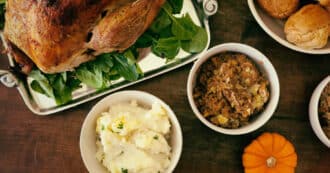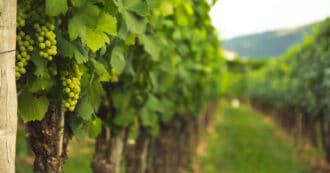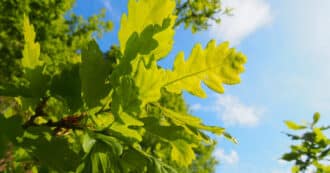Exodus 16:13-21 Through a Green Lens
The Rev. Dr. Leah D. Schade; leahschade@gmail.com
Ideas for reading and preaching Exodus 16:31-21 for a Thanksgiving sermon or reflection. This is part of the EcoPreacher 1-2-3 series to equip pastors and church members to engage the Bible through an ecological lens.
Many congregations mark the Thanksgiving holiday in the U.S. with an ecumenical or multifaith service in the days leading up to the holiday. The story of the Israelites receiving the miracle of manna in the wilderness is a powerful text for this occasion. For one, the story offers an alternative to the problematic “Pilgrim-and-Indians” mythology that perpetuates harmful stereotypes and presents a distorted narrative about colonialism. For another, it provides a counterpoint to the culturally sanctioned practices of gluttony, overconsumption, exploitative shopping, and greed that surround Thanksgiving.
Focus on Exodus 16:18-21:
But when [the Israelites] measured [the manna] with an omer, those who gathered much had nothing over, and those who gathered little had no shortage; they gathered as much as each of them needed. 19And Moses said to them, ‘Let no one leave any of it over until morning.’ 20But they did not listen to Moses; some left part of it until morning, and it bred worms and became foul. And Moses was angry with them. 21Morning by morning they gathered it, as much as each needed; but when the sun grew hot, it melted.
Eco-Exegesis
Eco-exegesis is a method of interpreting the biblical text through a green lens using the principles of ecological theology. For this passage, we turn to Eco Bible, a Jewish ecological commentary on the Hebrew texts.
At many Thanksgiving tables, plates will be heaped high with meats, vegetables, and an array of desserts. Given that the size of the typical American dessert has increased by 70 percent and the calorie content by 79 percent in the last thirty years, the concept of the omer in the story of the manna is important. An omer was just enough – no less than what was needed to satisfy hunger and no more than what could be consumed without gluttony. Rabbi Shimon bar Yochai taught that the daily appearance of manna showed the Israelites that they could trust God. This helped to cultivate hearts of gratitude.
But if they wasted the food, it “became infested with maggots and stank” (v. 20). In other words, the story of manna in the wilderness is directly related to our contemporary issues of food waste. On average, Americans waste a pound (450 grams) of food per person per day. Meanwhile an estimated 35 million people across America suffered from food insecurity in 2018. At the same time, the UN’s Food and Agriculture Organization estimates that one-third of all food produced around the world is wasted due to spoilage. This happens during storage, transport, in grocery stores, restaurants, and food service companies, and in homes. All of this wasted food has environmental consequences, from burgeoning landfills to greenhouse gasses that contribute to global warming.
Ironically, high food variety is one of the main causes of spoilage in the supply chain, while less variety leads to simpler stock management. Thus, on a holiday like Thanksgiving when society revels in the quantity and variety of foods available, a way to truly honor the spirit of the day is to learn the lesson of simplicity from the manna. People who are satisfied with a smaller dietary range do not need so much food transported from far and wide. As well, the omer of “just enough” can cultivate hearts of gratitude, justice, and compassion.
1. Eco-Idea
The Eco-Idea is one succinct statement that tells us who God is and/or what God does in relation to Creation and how we should respond as people of faith. The Eco-Idea for this passage is:
Through the story of the manna in the wilderness, God calls us to focus on gratitude, justice, and compassion for our neighbors and the Earth so that all may be fed and satisfied with the omer, “just enough.”
2. Eco-Questions
Eco-Questions are what we can ask to help a congregation draw out the implications of the Eco-Exegesis and Eco-Idea.
- If the average American wastes a pound of food per person per day, how many pounds of food do the members of your congregation waste in a year? Can we set a goal of cutting our food waste in half over the next year as a spiritual discipline?
- Given that a diet consisting of local food results in a smaller carbon footprint and lessens the burden of waste in the system, how can our congregation support local farms and food producers? In addition, how can we advocate for policies that eliminate food insecurity, hunger, and malnutrition?
3. Eco-Actions
Eco-Actions are ways that a congregation might respond to the Eco-Idea and Eco-Questions. One of these possibilities may have salience for your ministry context.
- Experts estimate that American households can save up to $1,600 each year by reducing the amount of food they waste. Host an educational event to help the congregation and community learn about food labels, what they mean, and how households can cut reduce their food waste through meal planning, freezing, canning, and composting food scraps.
- If your community has a farmer’s market, ask the vendors if they would be willing to donate their leftover food to be distributed to food-insecure households. Often vendors are happy to have their food go to good use rather than having to transport it to landfills and see it go to waste. Work with local congregations to set up distribution days so that the food goes directly to households.
- Have your congregation host a conversation between local restaurant owners and food bank managers and feeding programs. Find out how much food is thrown away in dining establishments. Then strategize for ways to divert leftover food to food banks and soup kitchens.
1Megan A. McCrory et al., “Fast-Food Offerings in the United States in 1986, 1991, and 2016 Show Large Increases in Food Variety, Portion Size, Dietary Energy, and Selected Micronutrients,” Journal of the Academy of Nutrition and Dietetics 119, no. 6, February 27, 2019, 923-933, https://doi.org/10.1016/j.jand.2018.12.004.
2Eco Bible Volume 1: An Ecological Commentary on Genesis and Exodus. Rabbi Yonatan Neril & Rabbi Leo Dee, editors. (Interfaith Center for Sustainable Development, 2020), 130-131. https://interfaithsustain.com/ecobible/
3Oliver Milman, “Amercians Waste 150,000 Tons of Food Each Day – Equal to a Pound per Person,” The Guardian, April 18, 2018, https://www.theguardian.com/environment/2018/apr/18/americans-waste-food-fruit-vegetables-study.
4Food Waste in America in 2021, https://www.rts.com/resources/guides/food-waste-america/.
5Shuai Yang, Yujie Xiao, and Yong-Hong Kuo, “The Supply Chain Design for Perishable Food with Stochastic Demand,” Sustainability 9, no. 7, July 2017, 1195, https://doi.org/10.3390/su9071195.
* Featured image source





